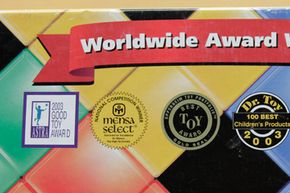Blokus Background and Brain Games
Blokus is a so-called "hobby game," meaning it's a bit more specialized than more mainstream games. Usually played at a clip (a Blokus game is generally a half hour long), these games prize strategy above, say, the luck of the draw that comes with Uno [source: Thai].
The game was dreamed up by a French designer, Bernard Tavitian. Apparently not one to loll around on the couch and watch reality shows in his free time, Tavitian boasts a master's degree in mathematics, an engineering degree and a doctorate in biophysics, among other accomplishments [source: Blokus].
Advertisement
Not satisfied with book smarts, Tavitian was also a painter. One day, he was attempting to frame a painting he had finished of an orchestra represented by geometric figures, and he decided that he wanted colored shapes to frame the picture. With the thought that each similarly colored piece should never touch, the game of Blokus was born [source: NAGC].
Another influence? The four-color theorem, first introduced in 1852 by Francis Guthrie [source: Thomas]. The theorem states that on any given map, you only need four colors to distinguish separate territories -- that is, without any borders of the same color touching each other, side by side. Well, it's a nice theory. But only a computer program has been able to prove it, and mathematicians are still searching for the ultimate human proof [source: MegaMath].
Theorems or not, you're still playing a brain game. As we said, it's gained a huge following in general and has been heralded by smarty-pants organizations like Mensa (a society for those special folks with the highest of high IQs) as a "Select" game, which "indicates that a game is original, challenging and well-designed" [source: Mensa].
Even scholarly journals like Mathematics Teaching in Middle School have highlighted the game's brain-boosting potential. An article published in the journal in April 2011 studied the use of Blokus in math classrooms as a learning tool. Authors Michael and Paula Maida determined that investing a short period of time in playing the game yielded improvements in students' geometric and spatial reasoning, as well as problem-solving skills [source: TeacherWeb]. (Middle schoolers, be sure to keep this article handy when you're caught playing Blokus on your phone in math class.)
Blokus can help you with more practical things, too. For instance, the financial investment Web site The Motley Fool even suggests that making agonizing decisions about where to situate your squares on a Blokus game board teaches you patient investment strategies. By judging priorities in a board game (should I attack aggressively or build patiently?), you're able to plan for the future while keeping an eye on what resources you need on hand [source: Maranjian].
Blokus FAQ
How do you pronounce Blokus?
Can you play Blokus with two players?
How do you win at Blokus?
Can you play Blokus online?
Is there a Blokus app?
Author's Note: How Blokus Works
Writing about Blokus is difficult. Not because the game is hard (I'm confident that a seven-year-old playing online beats me regularly) or because there's loads of background and research -- this isn't exactly Dungeons & Dragons, where a thorough history of the story is required. No, it's difficult to write about Blokus for the miserable excuse that it is fun to play Blokus. The game is addicting. So addicting, in fact, that every time I sat down to write, I instead found myself thinking of reasons to play the game -- research, you know -- instead of writing about it. One of the reasons Blokus is so satisfying is because although it is easy and doesn't require background, it's still a challenge to design and implement a strategy. Even educational experts see it as an intellectually beneficial game, which only leads me to drop what I'm doing to play another round. For my brain, you know.
Related Articles
Sources
- American MENSA. "Mensa Select Seal." 2012. (March 8, 2012) http://www.us.mensa.org/shop/mensaselect/
- Blokus.com. "Instructions." 2012. (March 8, 2012) http://www.blokus.com/pdf/notice-blokus-classic-en.pdf
- Blokus.com. "Home." 2012. (March 8, 2012) http://www.blokus.com/en/decouvrir.html?pays=us
- BoardGameGeek. "Blokus." (March 8, 2012) http://www.boardgamegeek.com/boardgame/2453/blokus
- Gough, John. "Blokus in Space." Australian Mathematics Teacher. Vol. 65. No.3. 2009. (March 8, 2012) http://dro.deakin.edu.au/eserv/DU:30024174/gough-diversionsblokus-2009.pdf
- Maida, Michael and Paula. "Problem Solving Around the Corner." Mathematics Teaching in Middle School. Vol. 16. No. 8. April 2011. http://www.teacherweb.com/CA/CLIME/CLIME/Blokus-Article.pdf
- Maranjian, Selena. "How games can make you a better investor." The Motley Fool. Jan. 12, 2010. (March 8, 2012) http://www.fool.com/investing/general/2010/01/12/how-games-can-make-you-a-better-investor.aspx
- National Association of Gifted Children. "Blokus Board Game." 2011. (March 8, 2012) http://nagc.vvhosting.co.uk/shop/productinfo.php?type=24&sortby=1&id=429&img=443&page=2
- Neumeier, Russ. "Fun, Spatial Thinking for the Entire Family." Wired.com. April 8, 2010. (March 8, 2012) http://www.wired.com/geekdad/tag/blokus/
- Thai, Kim. "Board games are back." CNN Money. July 10, 2009. (March 8, 2012) http://money.cnn.com/2009/07/10/news/economy/board_games_resurgence.fortune/
- Thomas, Robin. "The Four Color Theorem." Georgia Institute of Technology, School of Mathematics. Nov. 8, 2007. (March 8, 2012) http://people.math.gatech.edu/~thomas/FC/fourcolor.html
- Weisstein, Eric W. "Polyomino." (March 20, 2012) http://mathworld.wolfram.com/Polyomino.html
